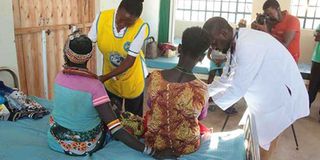Death toll in Marsabit Kala azar outbreak now rises to seven

Health workers at Laisamis Sub-County Hospital in Marsabit attend to children suffering from Kalar azar on April 20, 2019. The death toll as a result of the outbreak of the disease in Marsabit has risen to seven. PHOTO | JOSEPH KANYI | NATION MEDIA GROUP
What you need to know:
- Health Executive Jama Wolde said most of those who have died were aged below 18 years.
- Twenty seven are being treated at Laisamis Level Four Hospital while the other three are at Marsabit Referral Hospital.
- Loglogo is the area most hit while some cases have been reported in Laisamis and Korr.
The death toll in the Kala azar outbreak in Marsabit County has risen to seven after three patients succumbed to the disease last week.
The deaths come even as the county government rushes against time to distribute nets and spray areas affected by the outbreak.
Marsabit Health Executive Jama Wolde said most of those who have died were aged below 18 years while one was an elderly person.
The seventh victim died on Friday.
He said that a week ago, four people were confirmed dead – including three children and one elderly man – all from Laisamis Sub-County.
MINIMISE INFECTIONS
“Our attention is now focused on making sure that further cases are minimised if not completely eliminated,” Dr Wolde said.
He said the number of patients who tested positive and are admitted for treatment has also risen to 30.
Of these, 27 are being treated at Laisamis Level Four Hospital while the other three are at Marsabit Referral Hospital.
The increasing number of patients has overstretched the Laisamis Sub-County Hospital which has a capacity of 16 beds.
Dr Wolde revealed that vector control and suppression has already kicked off with up to 550 nets being distributed in the hotspot areas and about 200 households being targeted in the campaign.
MOST HIT
Loglogo is the area most hit while some cases have been reported in Laisamis and Korr.
He said that he has already appealed to the Kenya Red Cross Society and Concern Worldwide to help in war against the disease by allowing their ambulances to be used.
Speaking to the Nation, Laisamis Level Four Hospital Nursing Officer In Charge Yussuf Galmogle said wards are full to capacity as new cases are being diagnosed daily.
He said that between two and five patients are testing positive for Kala azar at the hospital every day.
OVER 20 TREATED
"We started receiving patients on March 26. More than 20 patients have since been treated and discharged and are responding well. We have 16 patients admitted while 14 others are outpatients," Mr Galmogle said.
Kargi/South Horr MCA, who is also the County Assembly Health Committee Chairperson Asunta Galgitele, accused the county executive of being slow in responding to the crisis.
"Though there are enough drugs for Kala azar treatment, there is an acute shortage of testing kits. The county should supply more testing kits and enhance public health education in the affected areas. There is ignorance among residents about Kala azar symptoms, which makes many patients come late for treatment," she said.
PASTORALISTS
She said that most residents who are pastoralists contract the disease in satellite camp sites where they take their livestock in search of pasture and water.
Kala azar is caused by over 20 species of parasitic protozoa of the genus Leishmania. The disease is transmitted to humans by sand flies (Phlebotomus and Lutzomyia species), which mostly live in anthills and mud houses.
It is endemic to 98 countries or territories, affecting around two million people each year.
The sand fly mostly bites between dusk and dawn.
Mr Galmogle said that Kala azar outbreaks in Marsabit are typical in dry seasons between March and June.






